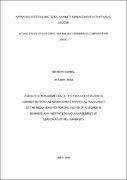| dc.description.abstract | This study examines the relationship between appraisal systems and total quality
management, a case study of National Water and Sewerage Corporation (NWSC), and how
the management could change the minds of its employees and realise that appraisal systems
and total quality management are necessary for learning and hard work within the
organisation. Therefore, the objectives of the study were: to determine the impact of
employee relations on total quality management in NWSC, to determine the impact of
operating procedures on total quality management in NWSC and to regulate the effect of
customer satisfaction on total quality management in NWSC. However, apart from appraisal
systems and total quality management, there were other variables called intervening variables
that affect both the dependent and independent variables. These include market orientation
and organisational structure. All these therefore make up the conceptual framework.
The literature review of this study has discussions on how appraisal systems and total quality
management coordinate to influence the organisational objectives. In this case, the findings in
chapter one were enhanced so as to show the level at which appraisal systems and total
quality management are used locally and internationally as well. For example, the literature
shows how employee relations influence total quality management, where employees have an
impact on the quality of the services provided by the organisation. This is through the
relationship they have with their supervisors, and how they work together to reach their goals.
The literature further mentions how operating procedures influence total quality management,
where the works and activities carried out in an organisation has a great impact on the quality
depicted by the services provided. An organisation should have the necessary operating
procedures carried out daily as routine. These procedures should have unique features that
amount to quality services provide to the customers. Customer satisfaction influences total
quality management where the customers want customer oriented services. This assists the
organisation in knowing its priority in providing the necessary quality services for prompt
customer satisfaction. The intervening variables which influence both the dependent and
independent variable were organisational culture and market orientation. The organisational
culture refers to the environmental values of the organisation and how the organisation
carries out its activities so as to amalgamate appraisal systems used and the total quality
management acquired in the long run. The market orientation as shown in the literature can
influence both the appraisal systems and the total quality management through marketable
resolutions on how the customers like their services to be delivered.
This study aimed at collecting both qualitative and quantitative data through the use of
primary sources (questionnaires) and secondary sources like text books, the internet, online
journals and e-books as well. In addition to these sources, a sample of 34 respondents was
selected. Respondents comprised of male and female, all employees in NWSC | en_US |


